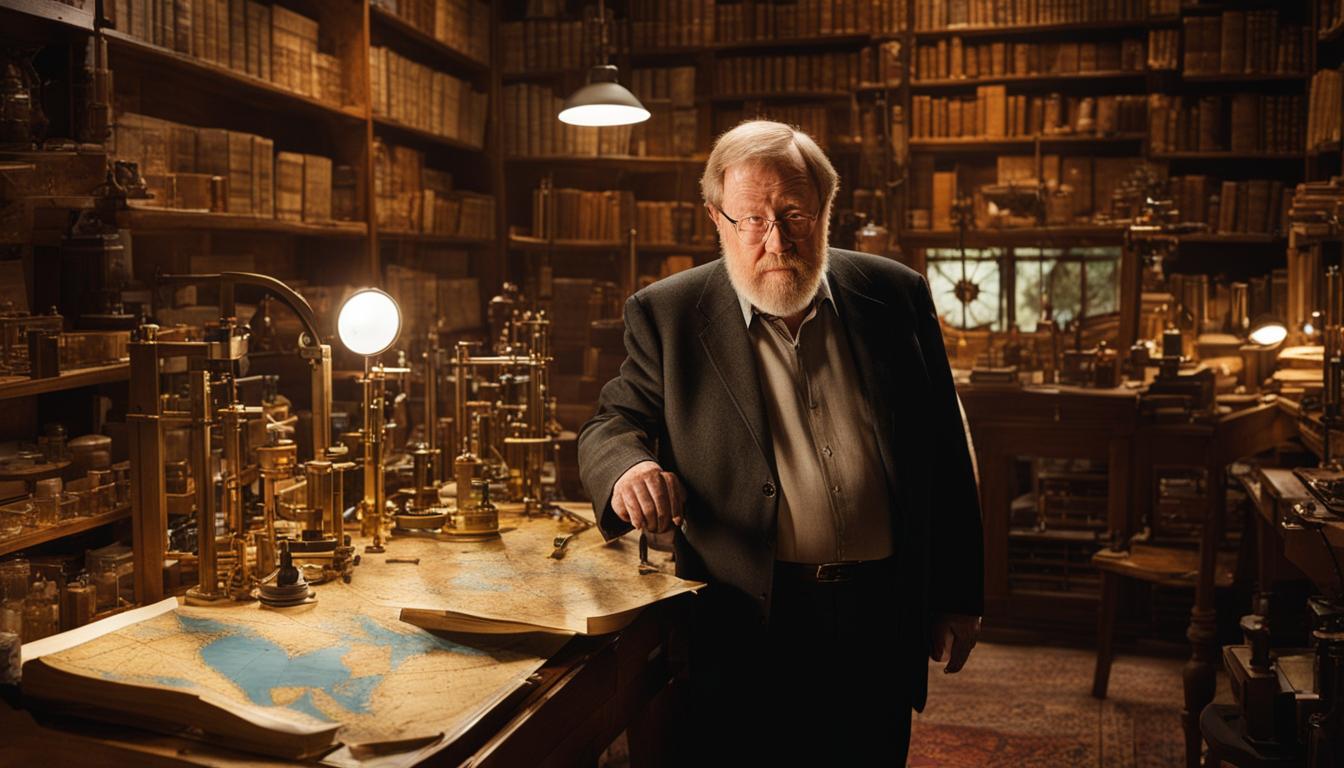In this audiobook review, we will delve into the fascinating world of science history with renowned author Bill Bryson’s “A Short History of Nearly Everything.” With his trademark engaging storytelling and wit, Bryson takes listeners on a captivating journey through the origins of the universe, the evolution of life on Earth, and the groundbreaking discoveries that have shaped our understanding of the natural world.
From the Big Bang to the mysteries of quantum physics, Bryson’s audiobook is a must-listen for anyone curious about the wonders of science. In this review, we’ll explore the key features of the audiobook, including the narration, production quality, and writing style, as well as its overall appeal to audiences interested in science history.
Key Takeaways
- Bill Bryson’s “A Short History of Nearly Everything” is a captivating exploration of science history, from the origins of the universe to the evolution of life on Earth.
- The audiobook features engaging storytelling, informative insights, and humorous anecdotes that make complex scientific concepts accessible to listeners.
- The narration and production quality of the audiobook are top-notch, providing an enjoyable and immersive listening experience.
- Bryson’s writing style is witty, engaging, and insightful, making “A Short History of Nearly Everything” a standout in the genre.
- Recommended for anyone interested in science history, natural wonders, or engaging non-fiction audiobooks.
Overview of “A Short History of Nearly Everything”
Bill Bryson’s “A Short History of Nearly Everything” is an audiobook that provides an in-depth exploration of science history. Bryson’s engaging approach to the subject matter makes it easily accessible to a wide audience, offering a comprehensive overview of the natural world, from the Big Bang to the emergence of complex life forms.
The audiobook covers a broad range of scientific concepts, including physics, chemistry, geology, and biology, providing a comprehensive understanding of the universe and the world we live in. Bryson’s writing blends scientific analysis with historical anecdotes, weaving a compelling narrative that keeps listeners hooked from start to finish.
Main Themes
The main themes of “A Short History of Nearly Everything” revolve around scientific discovery and exploration, highlighting the key insights and discoveries that have shaped our understanding of the world. From the origins of the universe to the inner workings of the human body, Bryson covers it all in vivid detail, providing listeners with a truly captivating listening experience.
Scope and Approach
The scope of the audiobook is broad, covering a vast range of scientific concepts and historical events. Bryson adopts a descriptive approach, providing listeners with colorful and engaging descriptions of some of the most complex scientific concepts, making them accessible even to those without a background in science.
The audiobook is divided into short chapters, each focusing on a specific topic or concept, making it easy for listeners to follow and understand the content. Throughout the book, Bryson incorporates fascinating stories, anecdotes, and personal insights that bring the subject matter to life, creating a truly immersive listening experience.
| Pros | Cons |
|---|---|
| Engaging writing style that blends scientific analysis with historical anecdotes. | The audiobook covers a vast range of topics, which may be overwhelming for some listeners. |
| Comprehensive overview of science history from the Big Bang to the emergence of complex life forms. | The scope of the audiobook may be too broad for listeners looking for a more specialized analysis of a particular topic. |
| Easy to follow structure with short chapters and engaging storytelling. | The audiobook is quite long, which may be daunting for some listeners. |
“Bryson’s audiobook offers a comprehensive and engaging overview of science history, providing listeners with a captivating listening experience that both educate and entertains. Highly recommended!”
Narration and Production Quality
One of the most crucial aspects of an audiobook is the narration and production quality. In “A Short History of Nearly Everything,” the narration by Richard Matthews is engaging and energetic, effectively bringing Bill Bryson’s words to life for the listener. Matthews’ voice is clear and easy to understand, and he does an excellent job of conveying the author’s humor and wit.
Furthermore, the overall sound quality and production value of the audiobook are top-notch. The audio is well-balanced and easy on the ears, making it a joy to listen to for extended periods. The production team has done an excellent job of overlaying sound effects and music where necessary, enhancing the listener’s experience without overwhelming the narration.
“Matthews’ voice is clear and easy to understand, and he does an excellent job of conveying the author’s humor and wit.”
All in all, the narration and production quality of “A Short History of Nearly Everything” are outstanding, contributing significantly to the audiobook’s overall appeal and enjoyment.
Highlights of ‘A Short History of Nearly Everything’
Bill Bryson’s ‘A Short History of Nearly Everything’ is a fascinating audiobook that delves into the rich history of science, exploring the key discoveries and innovations that have shaped our understanding of the world around us. Some of the book highlights include:
- An in-depth exploration of the origins of the universe, from the Big Bang to the formation of the solar system.
- The stories and struggles of the many scientists who contributed to our current knowledge, including Isaac Newton, Albert Einstein, and James Hutton.
- The impact of natural disasters on the course of human history, from earthquakes and tsunamis to volcanic eruptions and asteroid impacts.
- The intricate web of life on Earth, from the smallest microbes to the largest creatures, as well as the many extinct species that have populated the planet throughout its history.
- The book’s engaging and accessible storytelling, which makes complex scientific concepts easily understandable for listeners of all ages and backgrounds.
If you are looking for a captivating journey through science history, ‘A Short History of Nearly Everything’ is the perfect audiobook for you.
Bill Bryson’s Writing Style
Bill Bryson’s writing style is one of the key highlights of “A Short History of Nearly Everything”. With his engaging storytelling and ability to make complex scientific concepts accessible, Bryson makes this audiobook a standout in the science history genre. His use of humor and wit adds both entertainment value and clarity to the narration, making the audiobook an enjoyable and educational experience.
What sets Bryson’s writing style apart is his ability to merge scientific explanations with real-life anecdotes. Through relatable stories and historical context, he keeps the listeners hooked and helps them understand even the most complex of concepts. For instance, in his discussion of the Big Bang theory, he compares the moment of the universe’s creation to the sound of a detonating grenade, elucidating the scientific concepts to even those with limited knowledge and background on the topic.
Bryson’s writing style is not only enjoyable but also effective in communicating complex ideas. His storytelling approach and use of metaphors help listeners retain information, even after the audiobook is finished. The author’s brilliance in blending science and storytelling goes beyond his previous works, and he outdoes himself with “A Short History of Nearly Everything”.

“Science is the poetry of reality.” Bryson’s writing style exemplifies this sentiment, as he masterfully crafts real-life stories and scientific facts into a beautifully written audiobook that is sure to captivate audiences of all backgrounds and interests.
Praise for “A Short History of Nearly Everything”
Bill Bryson’s “A Short History of Nearly Everything” has received widespread critical acclaim, earning praise from both mainstream media outlets and science enthusiasts alike. The audiobook has been described as “masterful,” “engrossing,” and “fascinating,” with reviewers noting Bryson’s engaging storytelling and ability to make complex scientific concepts accessible to a general audience.
“Bryson turns science into poetry and has created a book that will prove to be one of the best popular science books written. Ever.” – The New York Times Book Review
Many reviewers have also praised the audiobook’s production quality, commending the narrator for his clear and expressive delivery. The combination of Bryson’s writing and the audiobook format has proven to be a winning combination, resulting in an immersive and captivating listening experience that has resonated with listeners across the globe.
| Publication | Review |
|---|---|
| The Guardian | “A genuinely witty and amusing guide to science…full of odd details and memorable phrases.” |
| The Boston Globe | “Bryson is a masterful storyteller, able to weave together narratives from disparate sources into a coherent and compelling whole.” |
| Science News | “An engaging and informative introduction to the history of science, perfect for readers of all ages and backgrounds.” |
Overall, “A Short History of Nearly Everything” is a book that has earned its place among the most acclaimed works of science history. Bryson’s skillful writing and the expert narration of the audiobook have combined to create a work of art that has captured the hearts and minds of readers from around the world.
Comparison to Other Science History Audiobooks
When comparing “A Short History of Nearly Everything” to other science history audiobooks, Bryson’s work stands out for its unique approach to storytelling. While other titles focus more heavily on specific scientific discoveries and their corresponding figures, Bryson weaves a narrative that is playful, engaging, and often humorous.
One of the key factors that sets “A Short History of Nearly Everything” apart from other science history audiobooks is its literary prowess. Bryson’s skill as a writer is evident throughout the audiobook, as he deftly explains complex scientific concepts in a way that is both accessible and entertaining. This is a standout feature that is not present in many other works in the genre.
The style of narration in “A Short History of Nearly Everything” also sets it apart from other science history audiobooks. Bryson himself narrates the audiobook, and his conversational style adds a personal touch to the storytelling that is often lacking in other titles. This makes the listening experience all the more engaging and immersive.

Comparing the content of “A Short History of Nearly Everything” to other science history audiobooks, it becomes clear that Bryson’s work is much more than a mere recitation of scientific discoveries. His storytelling style allows him to explore the human element behind scientific progress, making the audiobook much more relatable and engaging. This focus on storytelling over dry facts and figures is something that sets “A Short History of Nearly Everything” apart.
All in all, the comparative analysis of “A Short History of Nearly Everything” to other science history audiobooks demonstrates that it is a standout work in the genre, thanks to its well-crafted storytelling, literary prowess, engaging narration, and personal touch.
Target Audience and Recommendations
After analyzing the content and style presented in “A Short History of Nearly Everything,” we have identified the target audience for this audiobook. This work caters to anyone with an interest in science history, regardless of their level of knowledge about the subject. It also appeals to those with a curiosity about the natural world and a fascination with the underlying principles that govern it. The book is a fascinating exploration of the evolution of scientific discovery and will most definitely satisfy listeners seeking an engaging non-fiction audiobook experience.
For those who enjoy science history audiobooks, “A Short History of Nearly Everything” is a must-have in their audiobook library. With its witty combination of intriguing scientific discoveries and engaging storytelling, it offers an excellent balance between education and entertainment. Therefore, we highly recommend this audiobook to all.
Overall Recommendations:
- Recommended for science lovers
- Recommended for fans of engaging non-fiction books
- Recommended for curious listeners who want to learn more about the natural world
Overall, “A Short History of Nearly Everything” is a captivating audiobook that offers a fascinating glimpse into the evolution and patterns that shape our world. Whether you are an avid fan of science history or just a curious listener who wants to expand their horizons, this audiobook won’t disappoint you.
Conclusion
In conclusion, “A Short History of Nearly Everything” by Bill Bryson is a captivating and informative audiobook that offers a fascinating exploration of science history. Bryson’s engaging writing style and accessible approach make complex concepts easy to understand and enjoy, while the narration and production quality enhance the listening experience.
Throughout the audiobook, Bryson highlights intriguing scientific discoveries, shares historical anecdotes, and uses humor to keep listeners engaged. The critical reception and acclaim that “A Short History of Nearly Everything” has received are well-deserved, as this audiobook is a standout in the genre.
We highly recommend “A Short History of Nearly Everything” to anyone interested in science history, the natural world, or engaging non-fiction. The audiobook’s broad appeal and accessible content make it suitable for a wide range of listeners, from casual enthusiasts to dedicated scholars.
Overall, “A Short History of Nearly Everything” is a must-listen audiobook that offers valuable insights into the history of science and our place in the universe. We highly recommend it to anyone looking for an informative and engaging listening experience.



